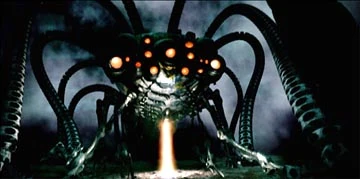I do industrial automation for a living, and I just want to point out that automating things that exist purely in the digital domain is far easier than automating things like ship breaking.
[…] I just want to point out that automating things that exist purely in the digital domain is far easier than automating things like ship breaking.
Not that you’re saying otherwise, however isn’t that even more of a reason more developers and resources should be allocated toward automating complex and risky physical processes?
Honestly, I don’t see how you would do it without general AI, which is something that will be solved in the digital domain first anyway.
Eh, it could be done with non-general AI. There are a finite number of different types of things to handle, so as long as it’s not thrown off by some bent steel or some missing consoles, I’d be amazed if they couldn’t automate at least specific ship designs.
Automation requires very high precision/consistency in the parts you want to work on. I seriously doubt that after many years of wear, tear, and impromptu repairs, those ships would be anywhere near consistent enough.
That’s why I said, “eventually with non-general AI”.
Even a well written algorithm could work with something that’s mostly in expected shape. How in the flying fuck is everyone so brainless that they cannot understand non-general AI can still adapt to things? Fucking hell.
I’m not talking about current industry practices. I’m talking about combining existing technology with unlimited bidget to create a factory that could kinda’ do the task.
“Possible” and “practical” are two extremely different things, and you goons pointing out that most obvious basic fact are adding nothing.
They still manually build ships right now what makes you think they could automate taking one apart
Notice how my post is not talking about the present tense.
Firstly, much of shipbuilding is automated. They use robots to paint them and apply anti-fouling coatings. They also use loads and loads of automated machinery to create the steel parts that make up most of the ship. Do you think some dudes are forging rivets, beams, and pipes by hand? No, those are made by machines that make zillions of them.
Secondly, nearly every ship–even ships that seem generic like big container ships–is a custom, one-off thing. They’re all bespoke (for the most part), being engineered for specific purposes, routes, and they even have “upgrades” for companies that pay extra (e.g. nicer quarters, extra antenna masts, more and special equipment mounting options, etc).
Cant imagine how it even could be automated without advanced robotics. Those ships are freakin HUGE! Maybe a collection of robotic snakes with cutting lazers attached to their heads and some little scuttle bots to pick up the pieces the snakes knock off? Just cut the whole thing into 1’ disks or maybe hexagons is better
Maybe a collection of robotic snakes with cutting lazers attached to their heads

Just make a huge version of those supermarket bread slicer machines and feed the ships through it.
Definitely not terrifying
OP: “We’ve tragically gone down a path of quantifying and min-maxing every aspect of existence, including creativity and the value of human life.”
Comments: “OP clearly doesn’t understand the comparative efficiency of the ROI here.”
Irony so thick you can cut it.
He’s right, why haven’t people started working on digitalized ship breaking…algorithms?
The robot dystopia will not be caused by evil AI enslaving humanity.
No matter how advanced or how self aware, AI will lack the ambition that is part of humanity, part of us due to our evolutionary history.
An AI will never have an opinion, only logical conclusions and directives that it is required to fulfil as efficiently as possible. The directives, however, are programmed by the humans who control these robots.
Humans DO have ambitions and opinions, and they have the ability to use AI to enslave other humans. Human history is filled with powerful, ambitious humans enslaving everyone else.
The robot dystopia is therefor a corporate dystopia.
I always roll my eyes when people invoke Skynet and Terminator whenever something uncanny is shown off. No, it’s not the machines I’m worried about.
No matter how advanced or how self aware, AI will lack the ambition that is part of humanity, part of us due to our evolutionary history.
The ambition isn’t the issue. Its a question of power imbalance.
The Paperclip Maximizing Algorithm doesn’t have an innate desire to destroy the world, merely a mandate to turn everything into paperclips. And if the algorithm has enough resources at its disposal, it will pursue this quixotic campaign without regard for any kind of long term sensible result.
The robot dystopia is therefor a corporate dystopia.
There is some argument that one is a consequence of the other. It is, in some sense, the humans who are being programmed to maximize paperclips. The real Roko’s Basilisk isn’t some sinister robot brain, but a social mythology that leads us to work in the factors that make the paper clips, because we’ve convinced ourselves this will allow us to climb the Paperclip Company Corporate Ladder until we don’t have to make these damned things anymore.
Someone screwed up if a paperclip maximiser is given the equipment to take apart worlds, rather than a supply of spring steel
This is kind of a dumb argument, isn’t it?
I have to imagine someone centuries ago probably complained about inventors wasting their time on some dumb printing presses so smart people could write books and newspapers better when they could have been building better farm tools. But could we have developed the tractor when we did if we were still handwriting everything?
Progress supports progress. Teaching computers to recognize and reproduce pictures might seem like a waste to some people, but how do you suppose a computer will someday disassemble a ship if it is not capable of recognizing what the ship is and what holds it together? Modern AI is primitive, but it will eventually lead to autonomous machines that can actually do that work intelligently without blindly following an instruction set, oblivious to whatever might be actually happening around it.
The argument isn’t against the technology, it’s against the application of that technology.
This isn’t even close to what they’re saying. It’s closer to complaining about how the Yankees replaced their star pitcher with a modified howitzer.
It’s not about people “wasting their time on some dumb invention,” it’s about how that useful invention is being used to replace jobs that people actually like doing because it’ll save their bosses money. It’s not even like when photography was invented or Photoshop came out and people freaked out about artists being put out of work, because those require different skill sets and opened up entirely new fields of art while also helping optimize other fields. This stuff could improve the fields that they’re created for by helping people optimize their workflow to make the act of creating things easier. But that’s not what they’re doing. It’s being used to mimic the skills of the people who enjoy doing these things so that they don’t have to pay people to do it.
Even ignoring the ethical/moral aspect of this stuff being trained without permission on the work of the people it’s designed to replace, the end goal isn’t to increase the quality of life of people, allowing us more time to do the things we love - things like, you know, art and writing - it’s to make the rich even richer and push people out of well-paying jobs.
The closest example I can think of is when Disney fired all their 2d animators and switched to 3d. They didn’t do it because 3d was better. In many ways, the quality was much worse at the time. But 2d animators are unionized and 3d animators aren’t, so they could get away with paying them much less. The same exact thing happened with the practical effects vs. digital effects guys in Hollywood right around the same time.
Society has always been losing jobs, the population just pivots to other specialisations. The only reason we fear it is because of our economic system that preys on it and turns it into profit, but that’s an other conversation entirely.
On the subject of losing creative venues, both your examples(photography and Photoshop) show how technology didn’t detract from the arts but add to it, letting the average person do much more. The same will be true for AI, I can see an inevitable boom happening in the filmmaking and animation industry, not to mention comic books and most of all indie gaming. It’s in the long run empowering for the individual imo.
The economic system is what he’s talking about here. That was my point. The entire conversation from the side against this stuff has always been about the economic situation of it. Without that factor, I think the only thing people would care about is whether or not their work is being used without their permission/maliciously.
As for Photoshop and photography, that’s actually why I brought those up specifically. Because they were feared as things that would destroy artists’ jobs and actually brought about entirely new fields of art - and also because they’re the two people bring up when people argue against LLM replacing people’s jobs, acting like they’re just some Luddites afraid of science.
Right now, the way I see it with AI is that there are 2 distinct groups benefiting from it: those whose workflow has been improved from the use of AI, and those who think AI can get them the result of work without having to either do the work themselves or pay somebody else to do it. And thanks to the economic issues that are at the heart of this whole thing, that second group is set to harm the number of people who can spend time creating things simply because they now have to work a job that isn’t creating things and no longer have the time to put towards that. So I can see AI creating a whole new art boom or a bust in equal measure. That second group is of concern to the art communities as well because they only see the destination and don’t see that the journey is just as important to the act of creation, and that is already causing schisms between artists and “prompters” who think that they’re just as skilled because they used a generator to make some cool stuff. People are already submitting unedited, prompted work to art and writing competitions.
I get the sentiment, but it’s a bad example. Transformer models don’t recognize images in any useful way that could be fed to other systems.They also don’t have any capability of actual understanding or context. Heavily simplifying here, tokenisation of inputs allows them to group clusters of letters together into tokens, so when it receives tokens it can spit out whatever the training data says it should.The only actual things that are improving greatly here which could be used in different systems are natural language processing, natural language output and visual output.EDIT: Crossed out stuff that is wrong.
Disappointed programmer here. I thought I could automate farming so that people wouldn’t die of hunger. Now I realise that if you automate farming, it would just make some CEO more money because his company now makes corn syrup and destroys rural communities even faster.
I got my “contract not renewed”, for the Fortune 500 B2B CRM company I worked for.
I can try to bust my ass to make my 2018 laptop try to render images I can’t draw, which does give me some pleasure. It’s not the AI tool’s fault humanity sucks, it’s the goddamn people with money.
I get the sentiment, but that is a really dumb take. Software automation is a hell of a lot easier than creating robotic automation to disassemble ships of all shapes and sizes. That’s why art automation has been done, and industrial freighter recycling automation has not been.
How would that even be possible? Presumably, you’d need to break the ships down into pieces first, and even then, you’ll be dealing with huge numbers of oddly shaped and sized components of varying materials. It makes a lot more sense to have people do that, though it is likely very dangerous.
Seems more like a job for unions and workplace safety regulations than for robots
more like a job for unions and workplace safety regulations
Yes. That’s why they do these things in third world countries. The people there are cheaper than robots will ever be.
Software automation being easier seems like a reason to not have so many people doing it, then? Like, the harder problem is the one that could really use all of the focus?
But the harder problems aren’t as obviously profitable for a large number of tech CEOs, and they’re not ripe for being a “winning glittery ticket” for a large number of comp sci students looking to be the next big thing in Silicon Valley.
I get the sentiment, but that is a really dumb take.
$13B invested in OpenAI feels more and more like malinvestment and graft, incentivized by our disastrous energy policy and enormous tech subsidies.
This isn’t purely software automation. Its also an investment in physical media and machines, new or renovated energy infrastructure, and enormous volumes of potable water.
Seems more like a job for unions and workplace safety regulations than for robots
In 2020, a leaked company memo detailed Amazon’s use of a new technology — the geoSPatial Operating Console (SPOC) — to analyze and visualize data sets pertaining to threats to the company, including unions. Reported by Jason Del Rey and Shirin Ghaffary at Vox, some of the data points related to unions include:
Amazon-owned Whole Foods’ market activism and unionization efforts. Flow patterns of union grant money. The presence of local union chapters and alt labor groups.The approach is an obvious attempt by the company to use more passive means of identifying and neutralizing union sympathizers in the company.
“Amazon’s tracking of workers’ micro-movements, decision points and searches and then linking all of that data to that of unions, community groups and legislative policy campaigns is union busting on its face,” said Stuart Appelbaum, President of the Retail, Wholesale and Department Store Union (RWDSU) in a statement at the time.
I think you absolutely nailed the analysis. Another small point to keep in mind is that for Microsoft, all the investment in OpenAi comes back as a revenue figure when the system works operating on top of the Azure platform.
That is very true, but my critique was more focused on the difference between automating software tasks vs mechanical tasks, especially with non-uniform inputs and not the economic investment required. Some tasks are better suited to automation - and plagiarizing art is far easier than deconstructing and recycling massive industrial freighters.
Not on the side of the AI art generators here - that was just low hanging fruit compared to something like was suggested in the original post. Definitely need extremely strong labor law to protect against AI union busting (and union busting generally)
my critique was more focused on the difference between automating software tasks vs mechanical tasks
Somewhat paradoxically, we’ve been much more successful automating mechanical tasks than digital ones. We’ve had steam looms and automotive assembly plants far longer than server farms and super computers.
And I might argue this kind of automation has been far more fruitful. I can point to a lot more in my daily life that has benefited from the industrialization of steel and plastic fabrication than what I’ve received from Google Search Results.
To say the millions of man-hours and trillions of dollars sunk into the advertisement and entertainment industries couldn’t be put to better use… Come on, man. The latest Marvel movie wasn’t so good that I wouldn’t have traded it for a globalized 1980s British NHS.
You know, interesting kind of aside here, I haven’t seen talked about anywhere at all, but I would like to interrogate everyone here about it to get their thoughts.
I don’t think AI is generally going to just replace artists wholesale, or is going to take over without some sort of editing, and that editing will probably necessitate a kind of creative process, and that’s probably going to be adjacent to what lots of artists already do. AI as a tool, rather than as a replacement. We saw this with the shift from 2d to 3d in animation. This was accompanied by lack of unionization in the 3d workforce, yes, and was incentivized by it, but the convergence of these mediums, even really only fairly recently, has bolstered artists’ ability to make much smaller projects work on a larger scale than they previously would’ve been able to. If you really need evidence of this, you can kind of look at much earlier newgrounds stuff vs the later work. There’s less people using that site now, and the userbase has probably aged up substantially over time, but I do think it’s probably fair to say that the quality of the work has gone up (quality obviously being subjective). Basically, Blender is a pretty good software, it’s very cool and good.
SO, to the point, if this is the case, and artists are able to substantially cut down on their workload, while still producing similar or larger outputs, or better outputs, will this actually affect art, kind of, as an industry? Is there a pre-allocated volume of art that public consciousness will allow to exist? In which case, the amount of artists would go down. Or is it more the case that there is only a pre-allocated amount of capital that can be given to art? In which case, the number of artists might be the same, and we might just see larger volumes of art in general? I think historically the latter is the case, but that might have changed, or, more realistically, I think it would be dependent on external economic factors.
The issue is that most art is not made just for display. Concept art, corporate art, icons, stock art, and more is how artists make their bread and butter. You might not be able to sell an unedited AI image as a print (yet), but making, say, 100 icons for a mid budget mobile game goes from a small freelance job for an artist to no job at all. Same for someone who makes all that stock art you see on news articles or random blogs. The truth is, the vast majority of the art we look at every day isn’t meant to be critically scrutinized, but it still requires artists to make. AI art dramatically reduces the small but numerous jobs for artist, who already struggle to make a living.
The contentious part is that all of this AI was trained on decades of living artists’ work (and associated descriptions provided for accessibility) without their permission, and now it is actively, not theoretically, replacing their jobs. Now artists are hesitant to even post the art they want to make for fear that models will be trained to reproduce their style.
I mean, twofold questions here. Were artists really wanting those jobs in the first place, for one? I would think that, you know, along those lines, this is just kinda the long end of a process that has been taking place throughout the whole of the 20th century. Used to be that you would have to get someone to paint your billboard, paint your glass storefront, used to be that you would have to hire skilled draftsmen to draw up blueprints on huge boards, for basically every product. Now we’re at the point where you only hire an artist to draw something if you really want to get something that looks very original, for some reason, because otherwise you can probably just get it in a stock library, and make whatever you want with stock assets, even without AI. You might also still be looking to artists for product design, but that’s maybe going to be less and less the case as you get design processes that are driven more by committee, and consumer feedback.
So along those lines, the total number of art available to artists to do, would be dwindling all the time, basically because the total amount of art floating around in culture, or at least, the total amount of art monetizable by culture, has remained the same for much of the 20th century, and automation has simply made it easier to get rid of artists.
Second question, right, is… I dunno, I forgot it. damn. There’s probably also some theoretical point about capitalism and how this is just the mechanism through how it’s working at current, and not the fault of the technology specifically as much as the organization and forces of the market, but I feel like everyone’s already made that point mostly, and it wasn’t gonna be my second question. I dunno maybe if I cook long enough I’ll remember what it was gonna be.
I’d argue that those are still jobs lost to automation, that just weren’t mourned like jobs are today because they weren’t lost after decades of huge swatches of jobs being taken over by automation.
When billboard painters were replaced there were 1000 other places they could go. When today’s fiverr app artist loses their small niche income to AI, they’re losing what was already their last ditch artistic income. It’s the same issue, but the scale makes it hit WAY harder now.
Ah yes just write code for the ship fold itself neatly back into reusable materials.
Just drop the ship off the conveyor onto a bar. The good ships will bounce higher, and the bad ones won’t. Problem solved.
Sarcasm aside, this is how they sort cranberries and where the expression “raising the bar” comes from. The higher the bar is set, the tighter the constraints on which cranberries will bounce onto the “good” conveyor.
This sort of ignores the fact that the advances in that technology are widespread applicable to all tasks, we literally just started with text and image generation because:
-
The training data is plentiful abd basically free to get your hands on
-
It’s easy to verify it works
LLMs will crawl so that ship breaking robots can run.
He’s ignoring it because he’s not complaining about the tech, but the way it’s being used. Instead of being used to make it easier for artists and writers to do their jobs, it’s being used to replace them entirely so their bosses don’t have to pay them. It’s like when Disney switched to 3d animation. They didn’t do it because the tech was better and made the job easier. They did it because 2d animators are unionized and 3d animators aren’t, so they could pay the new guys less.
And these are the kinds of jobs people actually want - to the point where they don’t pay anywhere near as well as they should because companies can exploit people’s passion for what they do.
Imagine a world of construction workers and road crews, but no civil engineers, architects, or city planners. Imagination and creativity automated away in the name of the almighty profit margin.
-
Making art and writing just happens to be easy to automate with neural networks and machine learning, neither of which was originally researched for the purpose of replacing artists and writers.
Good luck disassembling a ship with a neural network. And maybe do some research about the difficulties of application-specific robotics.
I think it is just a matter of where you put resources. I am sure if you put resources into improving recycling ships some advancements will be done (it won’t be done using neural network probably).
But that’s true of everything. This guy is explicitly angry about AI not being used in ship decommission, which is just weird.
It’s not about the ships.
Shipbreaking is the author’s example, but it’s not the author’s point.
He could have bemoaned the lack of tree-trimming robots or the vaporware nature of self-driving cars instead.
The key point is the heavy investment in automating away things that bring us joy while doing nothing about vast classes of unpleasant drudgery.
Hell, look at roofers. A lot of injuries there are from falls, easily preventable with fall harnesses. It doesn’t even require a big research investment! Our society simply doesn’t value those lives enough to protect them.
No they are developing an autonomous system to solve pretty much every possible problem, but these problems are easy problems so they’re the ones that are getting automated first. Make no mistake they will come for every job.
Define art, though.
As it stands neural networks and LLMs can’t do it, because they lack imagination. A human can use it as tool to make art though, and we don’t have these silly kinds of conversations about photoshop (anymore!).
As for the OP, you’ve taken it a bit more literally and reacted a bit more defensively than I think is warranted. The point is about our systems priorities, not so much the specifics.
I LOATHE writing longer texts.
Have you tried not being illiterate? It’s super helpful.
Have you tried not emulating the personality of a piece of sand paper? That’s super helpful too!
This shit again?
The tasks AI is replacing only require powerful computers and internet access.
If you want to make that comparison, to scrap fucking ships using AI, you need a robot that the AI can control.
Or what else do you want to do? Putting a fucking computer server that is running some ship scrapping AI in the middle of a shipyard and see if it magically grows arms?
No, I’m not denying we have an issue with this fucking capitalism (with and without AI), but stop comparing “software” tasks with other tasks what would required specialized machinery/robots.
Isn’t the point that we don’t bother looking into those specialized machines and tools because why bother when we can just throw meatbags at it?
But this is total nonsense because those tools are getting developed and have huge budgets. Many of them are already on the market and in use, especially remote control cutting tools.
Far more money has been invested in self drive and ambulatory robotics than image gen, it just so happens image gen is far easier than walking or using a saw.
Gpt 5 is coming around October and I think it’ll likely be the version that is able to effectively create task based workflow so it’ll be able to set up simulation training to evolve kinematic solutions within a framework, basically the thing we need robots to be able to do. When that’s possible you can expect to see a big boom in multiuse robotics.
“AI” researcher here. The only reason there are models that can “write” and “create art” is because that data is available for training. Basically people put massive amounts of digital text and images on the Internet and the companies scraped all of it to train the models. If there were big enough datasets for ship building, that would happen too…
Not really. You would still need to, you know, build drones or automated factories to actually perform the salvaging. But the point is that nobody DID, because capitalism values profit over human life. Nobody who “matters” is interested in solving that problem.
Actually that’s not true at all, there’s lots of interest in robotics (check out Boston Dynamic) but it’s a really really hard problem. The main issue is developing a controlling intelligence sophisticated enough to be able to use the robot to do a diverse range of tasks. The actual physical mechanical building of the robot isn’t that hard.
Of course the way you get that controlling intelligence is AI. So he is complaining about people developing a solution to the problem he’s demanding that they solve. He’s not happy because they’re not magically skipping steps.
This idiot wants fully sapient robots without developing AI in the first place, not sure how on earth he expects that to happen.
I think you’re underestimating the mechanical and chemistry problems that still need to be solved before autonomous robots that can perform a task like ship salvage effectively. There’s a very good reason that basically all industrial robots spend their lives plugged into a wall socket.
Besides, what the guy is yapping about it is 80% a robotics problem not an AI problem. It’s apples and oranges.
He’s essentially saying why can Will Smith finally eat pasta normally while we still don’t have the robotic workforce from the 2001 Will Smith movie “I, Robot”.
He’s a programmer, why doesn’t he stop working on aligning buttons on web applications and work on shipbuilding robots!?!?













